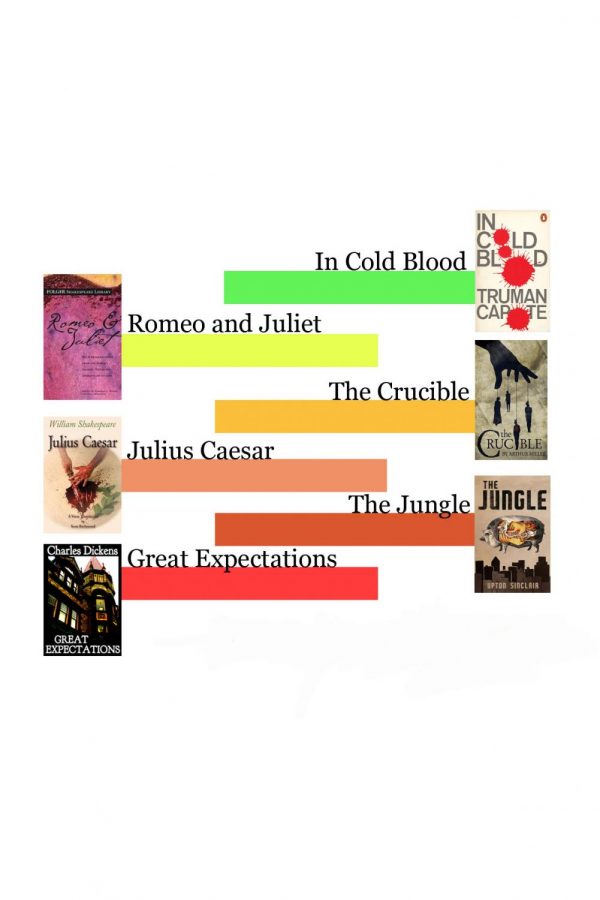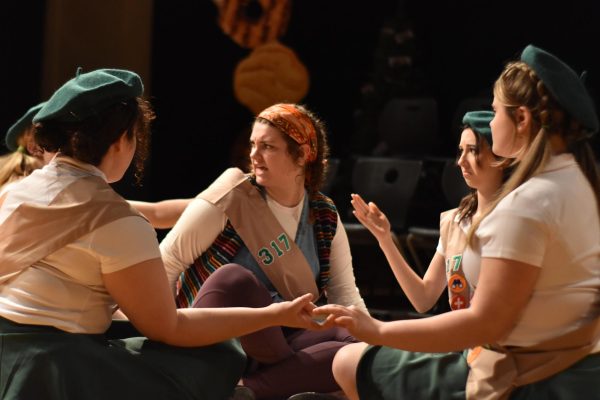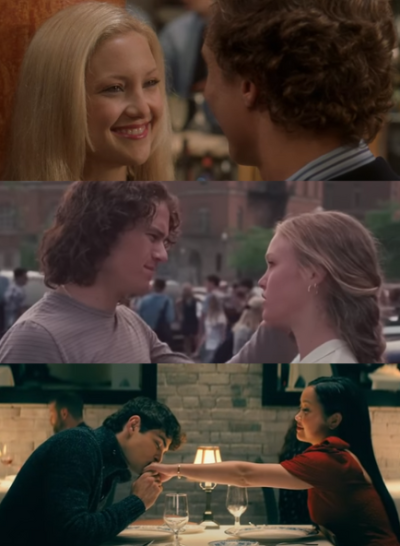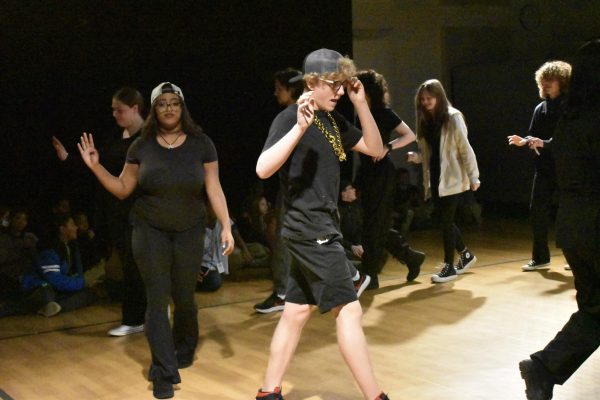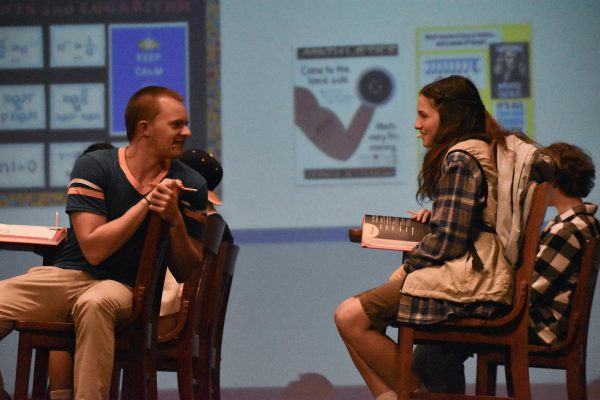Madison’s take on mandatory readings
January 23, 2018
While I do not enjoy reading mandatory books, I do not hate them either. I read them, most of the time, and I only read them because I have to. They may be dreadful to get through, but that doesn’t mean all of them are literary damnation.
Each story reminded me of a certain aspect I’ve come across in my life, and others I haven’t but the sentiments felt right. Instead of being a basic book cover, each one ended up taking on an image in my mind looking back at the struggles and joyous occasions that I was put through on this reading rollercoaster.
Hot alphabet soup was poured into my lap freshman year when I decided to take Honors/GT English 9 because I had never read that many books in a school year that didn’t include a picture. “The Odyssey” was our summer reading project that was supposed to help us transition into a more in-depth reading that would be required of us in the class compared to 8th grade, but instead of absorbing the message that the teachers were trying to send, procrastination got the best of me, and I was off to a rocky start because the text couldn’t keep my attention. I’d give it a three out of five mainly because it wasn’t horrible. It was just average in comparison to all the other readings, but losing my attention numerous times was a real killer in my understanding and overall enjoyment of the book.
The soup got worse from there. Bloody meat was plopped down, mixing up all the letters and staining my pants. Fresh cut. Vivid details. “The Jungle” was well written but so full of sorrow and grotesque imagery. It was one of the worst books I’ve ever read in high school, and that’s why it gets a one out of five. I could only pay attention to it when I wasn’t thinking about how much the characters were suffering from being immigrants who worked in a slaughterhouse in an era when sanitation wasn’t a big deal or when I ignored the fact that they were based on real-life events. Not to mention a baby drowned in a puddle, so the morals of this story are the opposite of what a feel-good reading should be, making it steaming hot coffee. I hate coffee.
“Romeo and Juliet” was a thorn in the side of my leg because it was my first memorable run-in with Shakespeare, and the diction and attention to detail was hard to pick up on, so I struggled through the reading. But after numerous class discussions, I understood that basically everyone dies, and you can go home now. I give it a four out of five because I’m now thankful that I read it, especially since I see now that Shakespeare is a base for many plot lines of the tragic and romance genres. Caesar salad was up next: leafy goodness that was full of a change of language and style in comparison to all my previous readings. “Julius Caesar” proved to be a three out of five because it was tolerable and interesting enough to read with the help of Sparknotes.
The demanding comprehension of Shakespeare wore me out at that point in the year, and then I was assigned “Great Expectations.” The title made me think that the book would hold up great expectations which I had for most of the previous readings, like a fresh change of pants. But of course it proved the opposite. Long, boring nights were spent on trying to wrap my head around why we were reading this story, so it gets a one out of five: dedicated to all those precious hours of sleep I lost.
Both “Fast Food Nation” and “To Kill A Mockingbird” showed me that not everything we read will be pain, more like life lessons in the form of hidden symbolism, so I gave them both a four out of five. I picture “Fast Food Nation” as some McDonald’s fries, mainly because the book dealt with how the American meal has changed and what horror hides behind the counters in fast food joints. I protested fast food for a month after reading it, but like the fries, the book was really good but also bad for me because the calories in them and the calories (of information) I gained weighed heavy on my mind. No one wants to think about a gruesome slaughterhouse filled with bloated, tortured animals on the way to their deaths and not-quite-real potatoes when they order a quick meal. “To Kill A Mockingbird” proved to be different because it was like watching a black and white movie with no words, just captions. Meaning the story was well told, but it lacked a true literary point because there were so many pieces that it was easy to get lost in one situation or another. For example, one scene could be about a tree in a front yard while dealing with an unfair court case in the background, and there was many other plot lines going on so it got convoluted at times. When it was done, I felt the whole story was like an apple, like the one freshly fallen from a tree onto my head: still good to consume, but it hurt my noggin.
My lap was a mess, and this is just getting into sophomore year when I took Honors/GT English 10. “The Crucible” was dealin’ with the Devil, but he wasn’t in Georgia. He was in Salem. It proved to a be a three out of five. A decent read, but definitely not the best one, just like some fire under my belly to make sure I was actually paying attention- which I wasn’t because I was trying too hard to read the parts out loud that I volunteered for during class reading. The same issue came up with “A Raisin in the Sun,” but this one was easier to follow since it dealt with a struggling family in the 1950s instead of supposed witches in 1692. I would say it’s more of a grape because of how well it was written and the hidden motif about selling souls to the devil sure caught me off guard, but I still have to give it a three out of five.
Sure enough, the weight of reading and looking up information at the last minute for quizzes we had on literary terms, figurative language or an entire passage that I forgot to read was beginning to stress me out. Then we read “Huckleberry Finn.” Goin’ down that Mississippi with Huck and Jim, the way the author employs the accents of Southerners to bring the story alive when certain characters talk, which I had never seen done before, made the story come to life. It was a uniquely beautiful read because of how a 13-year-old boy causes so much trouble in his neighborhood, but cares enough about his runaway-slave friend that he decides to accompany him on the long, dangerous journey: that’s mainly why I give it a five out of five. Also, I’d say it was a fresh scoop of ice cream in comparison to the vigorous readings of the past.
Back to some meat, but this time it’s cooked. Cooked because “In Cold Blood” gave a savory taste on mental illnesses that were rarely discussed inside the classroom and it had a certain thrill to it since some schools had banned the book entirely. Overall it was a five out of five.
Then came junior year, when I took AP Language and Composition. One of the first readings we had was heavy. “The Things They Carried” was about the Vietnam War, and it had scenarios that were impactful just by using figurative language and attention to detail that transposed readers to the peak of harsh emotions for each chapter. Rest in peace, baby water buffalo. I’d say it was a five out of five, and it really was like a hatchet to the heart knowing these scenarios were similar to those of soldiers.
Flowers are not to be trusted. Daisy was like a venus fly trap to good ole Jay Gatsby, enticing him in while I screamed at the book that he was an imbecile for even meddling into a marriage. “The Great Gatsby” taught me that falling in love will make you do strange things, like take the blame for your former lover’s accident: hitting an “innocent” with your car. I’d give it a four out of five and add in a green olive for this old sport since many of the main characters were rich and drank martinis, which have green olives in them.
So far we’ve only had two mandatory books for senior year in my AP Literature and Composition class. The first was “Oedipus,” and that just needs not to be talked about by how uncomfortable I became the moment I realized the truth behind his royal relationship. It was a five out of five, though, mainly because it was an enjoyable challenge to read, and Greek mythology is always fun. It added some chicken feathers, since Oedipus’ fight or flight instincts kicked in to protect his country from perishing, but like a chicken about to be slaughtered, his feathers were getting plucked off the further he struggled to know the truth.
The thing that bothered me about “Hamlet” was no one needed to die. All of the story could have been avoided if Hamlet the First just kept his sword in his sheath and swallowed his pride. It was a good read, and that’s why I gave it a four out of five. But still, it was very annoying that everyone died in the process of five minutes, it seemed like, and that’s what made the latest ingredient, poisoned wine, drop into my lap.
These stories really were a pain to read, but proved to be worth it because I now have an arsenal of books from the Greeks to the Vietnam War. I’m glad I got the chance to read them even though I became well acquainted with late nights and Sparknotes and procrastination at the maximum level. At least now I’ll understand the inside jokes that come from each of the readings. So books, books wherefore art thou books, tis the greatest curse and blessing that has ever been brought upon me.


